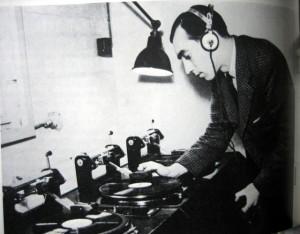Cometh the hour, cometh the words…
In 1866 a collection of poetry by Paul Verlaine was published in Paris entitled ‘Poemes Saturnienes‘. In amongst the collection was ‘Chanson d’automne‘. Over the years which followed the poet’s fortunes waxed and waned. Despite being feted by some as the ‘King of poets’, he died in 1896, aged 52, irreparably addicted to drugs and alcohol. Almost eighty years after it was first written, the words of the poem surfaced again. Broadcast on June 1st 1944 the first line of the poem signalled to the French Resistance that an allied invasion was to be expected with the next two weeks. When the first two lines of the poem were broadcast at 11.15pm on June 5th 1944, it signalled that the invasion was now to be expected within 48 hours. You can hear the latter broadcast by clicking on the image below, the lines of the poem apparently inserted at random between other lines of information for ‘our friends in occupied countries’:

Image: deuxiemeguerremondia.forumactif.com
CLICK to hear the broadcast from June 5th 1944
In this way, two lines of relatively obscure poetry came to play a role in an epochal moment of European history.
I was reflecting on all this as I read once again the account of Pentecost Day to be found in Acts. Looking around at the faces of his friends – each reflecting the glow of the Holy Spirit’s flame – Peter realised that a long awaited moment was under way. Seizing that moment, he stood to address the agitated crowd gathering in the street outside. In a feat of astounding instinctive interpretation, Peter takes upon his lips Joel’s seven hundred year old words and says ‘this is what he was talking about…’
Neither Verlaine in Paris, nor Joel in Judah, could have know the ways in which their words would acquire a significance in a later historical context. Whilst the words remained unchanged, the circumstances in which they were both spoken and heard invested them with all sorts of new meaning. Do we take full account of this in the act of preaching, I wonder? To what extent do we acknowledge the impact of contemporary context on the art (or is it a science?) of hermeneutics?
